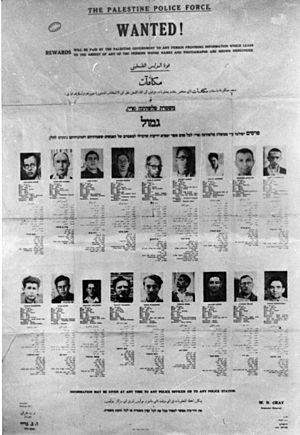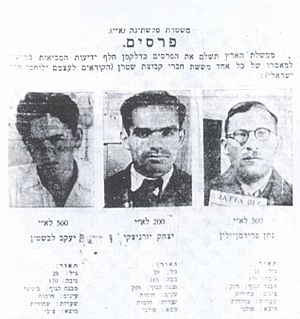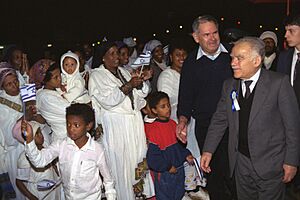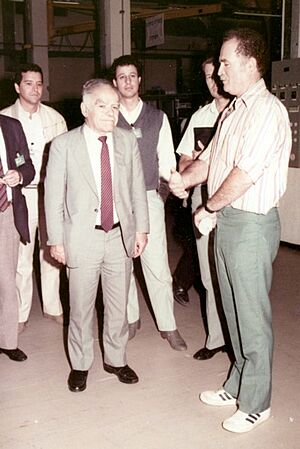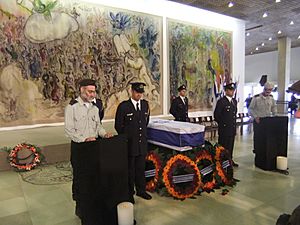Yitzhak Shamir facts for kids
Quick facts for kids
Yitzhak Shamir
|
|
|---|---|
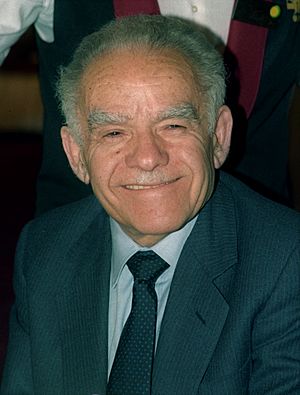
Shamir in 1992
|
|
| 7th Prime Minister of Israel | |
| In office October 20, 1986 – July 13, 1992 |
|
| President | Chaim Herzog |
| Preceded by | Shimon Peres |
| Succeeded by | Yitzhak Rabin |
| In office October 10, 1983 – September 13, 1984 |
|
| President | Chaim Herzog |
| Preceded by | Menachem Begin |
| Succeeded by | Shimon Peres |
| 6th Speaker of the Knesset | |
| In office June 13, 1977 – March 10, 1980 |
|
| Preceded by | Yisrael Yeshayahu |
| Succeeded by | Yitzhak Berman |
| Minister of Foreign Affairs | |
| In office March 10, 1980 – October 20, 1986 |
|
| Prime Minister |
|
| Preceded by | Menachem Begin |
| Succeeded by | Shimon Peres |
| Personal details | |
| Born |
Icchak Jaziernicki
October 22, 1915 Ruzhinoy, Russian Empire |
| Died | June 30, 2012 (aged 96) Tel Aviv, Israel |
| Nationality | Israeli |
| Political party | Likud (1970–1996, 2003–2011) |
| Other political affiliations |
|
| Spouse |
Shulamit Shamir
(m. 1944; died 2011) |
| Children | 2 |
| Signature |  |
Yitzhak Shamir (born Yitzhak Yezernitsky; October 22, 1915 – June 30, 2012) was an important Israeli politician. He served as the seventh Prime Minister of Israel for two terms: first from 1983 to 1984, and then from 1986 to 1992. Before Israel became a country, Shamir was a leader in Lehi, an underground group that worked for Israel's independence. After Israel was formed, he worked for the Mossad, Israel's national intelligence agency, from 1955 to 1965. He also served as a member of the Knesset (Israel's parliament), the sixth Speaker of the Knesset, and the Foreign Affairs Minister. Yitzhak Shamir was the third-longest-serving prime minister in Israel's history.
Contents
Early Life and Family
Yitzhak Yezernitsky was born on October 22, 1915, in a village called Ruzhany. This village was in the Russian Empire (now Belarus) and had many Jewish people. His parents were Perla and Shlomo, who owned a leather factory.
Later, Yitzhak moved to Białystok and went to a Hebrew high school. As a teenager, he joined Betar, a Zionist youth movement that believed in establishing a Jewish state. He started studying law at the University of Warsaw but stopped to move to what was then called Mandatory Palestine.
Family Tragedy During the Holocaust
During the Holocaust, Yitzhak's parents and two sisters were killed. He believed his father was killed by villagers near his hometown after escaping a German train. His mother and one sister died in concentration camps, and another sister was shot. Shamir once shared that his father, facing Nazi occupation, said he had a son in Israel who would get revenge.
Moving to Israel and Marriage
In 1935, Shamir moved to Palestine and worked in an accountant's office. He later changed his last name to Shamir, which he used on a secret identity card. He told his wife that Shamir means a "thorn that stabs" and a "rock that can cut steel." In 1944, he married Shulamit, whom he met in a detention camp. They had two children, Yair and Gilada. Shulamit passed away in 2011.
Joining the Underground Movement
Shamir joined the Irgun, a Zionist group that opposed British rule in Palestine. In 1940, the Irgun split, and Shamir joined a more active group called Lehi, also known as the Stern Gang.
Imprisonment and Escape
The British authorities arrested Shamir in 1941. He escaped from a detention camp in 1942 by hiding and then sneaking through fences. After his escape, Shamir helped reorganize Lehi. In his memoirs, Shamir later admitted he ordered the death of Eliyahu Giladi in 1943, due to disagreements over their group's actions.
Leading Lehi and Key Operations
By 1943, Shamir became one of Lehi's three leaders. He used the nickname "Michael" after the Irish leader Michael Collins, whom he admired. Shamir planned the 1944 killing of Lord Moyne, a British minister. Moyne was targeted because he was seen as responsible for limiting Jewish immigration to Palestine.
In July 1946, Shamir was arrested again by a British police officer who recognized him. He was sent to a detention camp in Eritrea, Africa. Lehi members later found and killed the police officer in September 1946. Shamir escaped from the prison in Eritrea in 1947 through a long tunnel. He eventually made his way to France and was granted political asylum. Lehi sent him a fake passport, and he returned to Israel after it declared independence in 1948.
Lehi After Israel's Independence
During the 1948 Arab–Israeli War, most Lehi members joined the new Israel Defense Forces. Lehi officially ended in May 1948. However, the Lehi group in Jerusalem continued to operate. In September 1948, Shamir and other leaders approved the killing of Count Folke Bernadotte, a United Nations representative in the Middle East. Lehi feared Israel would accept Bernadotte's peace ideas, which they thought were bad for the new country. The Israeli government then declared Lehi a terrorist organization and arrested many members, but they were later given amnesty.
Working for the Mossad
After Israel became independent, Shamir worked in business for a few years. In 1955, he joined the Mossad, Israel's intelligence agency, and worked there until 1965. While at the Mossad, he led "Operation Damocles," which involved targeting German rocket scientists working on Egypt's missile program. He also managed a unit that placed agents in other countries and helped plan Mossad operations. Shamir left the Mossad in 1965 because he disagreed with how its director was treated.
Political Career Begins
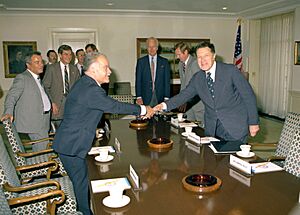
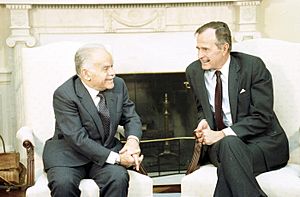
In 1969, Shamir joined the Herut party, led by Menachem Begin. He was first elected to the Knesset (Israel's parliament) in 1973 as a member of the Likud party. He became the Speaker of the Knesset in 1977. In 1980, he became the Foreign Minister, a position he held until 1986. During this time, he also served as prime minister from October 1983 to September 1984 after Menachem Begin resigned.
Becoming Prime Minister
Shamir was known for his firm beliefs within the Likud party. In 1977, he was the Speaker of the Knesset when Egyptian President Anwar Sadat visited. Shamir did not vote for the Camp David Accords or the peace treaty with Egypt. However, as Foreign Minister in the early 1980s, he helped with talks to make relations with Egypt normal after the treaty.
First Term as Prime Minister
Shamir became prime minister in October 1983. He faced challenges like high inflation in Israel and the ongoing situation in Lebanon. In the 1984 election, no single party won clearly. So, a "national unity government" was formed between his Likud party and the Alignment party, led by Shimon Peres. As part of this deal, Peres was prime minister until September 1986, when Shamir took over again.
Second Term as Prime Minister
When Shamir became prime minister again in 1986, his tough image seemed to soften a little. However, he was still hesitant to change Israel's relations with its Arab neighbors. He stopped Peres's plan for a regional peace conference with King Hussein of Jordan in 1987.
In 1988, Shamir was re-elected. He and Peres formed another coalition government. This government ended in 1990, leaving Shamir with a smaller government made up of right-wing parties. During this time, Palestinians in the West Bank and Gaza Strip started the first Intifada, a period of protests and unrest, which the Israeli government responded to with force.
Helping Soviet Jews Immigrate
Shamir strongly believed that Jews from all over the world should come to Israel. He asked the US government to stop giving refugee visas to Soviet Jews, arguing that they already had a homeland in Israel. In 1989, many Jews began to leave the Soviet Union. In October 1989, the US agreed to Shamir's request. After this, Israel became the main destination for Soviet Jewish immigrants. Over one million Soviet Jews moved to Israel, many of whom might have gone to the United States if the policy hadn't changed.
Gulf War and Peace Talks
During the Gulf War, Iraq fired missiles at Israel. Iraq hoped Israel would strike back, which would upset the Arab countries helping the United States against Iraq. Shamir initially sent Israeli jets to patrol. But after the US and Netherlands sent missile defense systems, and the US asked for calm, Shamir agreed not to retaliate.
During his time as prime minister, Shamir helped Israel build diplomatic ties with many countries in Africa and Asia. In May 1991, he ordered "Operation Solomon," which airlifted 14,000 Ethiopian Jews to Israel. He also restored diplomatic relations between the Soviet Union and Israel in 1991.
Relations with the US became difficult because Shamir was against the Madrid peace talks. US President George H. W. Bush was hesitant to approve loans for Israel to help new immigrants. Shamir eventually agreed to participate in the Madrid talks in October 1991. His government then collapsed, leading to new elections.
Retirement and Later Life
In the 1992 election, Shamir's party was defeated by Yitzhak Rabin's Labor party. He stepped down as Likud leader in March 1993 but remained a member of the Knesset until 1996. For a while, Shamir criticized his successor, Benjamin Netanyahu, saying he was too unsure when dealing with Arab nations. Shamir even left Likud in 1998 but later returned to support Ariel Sharon in 2001. In his later years, Shamir stopped making public comments.
Illness and Death
In 2004, Shamir's health worsened due to Alzheimer's disease, and he moved to a nursing home. Yitzhak Shamir passed away on June 30, 2012, at the age of 96. He had been suffering from Alzheimer's since the mid-1990s. He received a state funeral on July 2 at Mount Herzl in Jerusalem, where he was buried next to his wife, Shulamit.
Tributes and Legacy
Many Israeli leaders shared their sadness and respect for Shamir. President Shimon Peres called him "a brave warrior for Israel" and "a great patriot." Prime Minister Benjamin Netanyahu said Shamir "led Israel with a deep loyalty to the nation." Foreign Minister Avigdor Lieberman said Shamir "contributed greatly to the foundation of the state." Defense Minister Ehud Barak described Shamir as "stable as granite" and dedicated to Israel's freedom and security.
Awards and Recognition
In 2001, Yitzhak Shamir received the prestigious Israel Prize. This award is given for lifetime achievements and special contributions to Israeli society and the state.
|
See also
 In Spanish: Isaac Shamir para niños
In Spanish: Isaac Shamir para niños
 | James Van Der Zee |
 | Alma Thomas |
 | Ellis Wilson |
 | Margaret Taylor-Burroughs |


